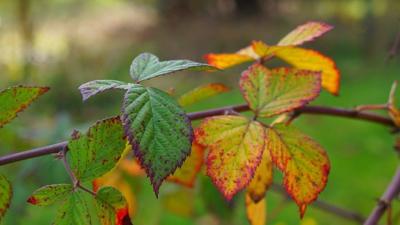DEAR AMOR: Something is happening to the leaves on my blackberry canes. It starts at the bottom leaves and then they die and fall off as it moves up to the next set of leaves. One entire cane died and I removed it. What could be the matter? — Carson
DEAR CARSON: Years ago, we had a lot of blackberries growing by the garden and some behind a metal shed where we live. They have thorny canes, which by the way, are known to be winter hardy compared to the thornless canes. I used to gather blackberries and ate them fresh with my family.
You described verticillium wilt infection on your blackberry vines, if those infected canes are the current year’s growth. Attacks by this fungus start at the bottom leaves, and then they die and fall off as the infection moves up to the next set of leaves. It will eventually kill the entire cane. This fungus overwinters in the soil.
Nutrients
Blackberries are high in antioxidants, high in fiber, high in vitamin C, high in vitamin K, vitamin A and copper, and are a good source of potassium, phosphorus, iron, zinc and calcium.
Hardiness
Blackberries are hardy in zones 5 to 10. Thorny blackberries are more winter-hardy than thornless varieties.
pH
According to USDA, blackberries prefer a mildly acidic soil pH of 5.5 to 6.8. Alkaline soil can be corrected by the application of organic materials, sphagnum peat, or fertilizers labeled specifically to acidify the soil.
Planting
Select blackberry cultivars that are resistant to verticillium wilt. Plant this biennial cane with perennial rootstock in well-draining sandy loam to prevent root rot and other diseases.
Locations previously planted with tomatoes, peppers, potatoes, eggplants, strawberries, or raspberries are not ideal for planting blackberries. These fruits and vegetables are susceptible to verticillium wilt and may have already left a fungus there.
It is also best that these fruits and vegetables are not planted close by so wind dispersal of infection will be unlikely.
Provide plant support so the canes will not fall on the ground. Plants will become critter hideouts if they allowed to grow naturally on their own. Post and tie wire can give support when canes are heavy with fruit.
Pruning
Blackberry plants produce fruits on 2-year-old canes. It is easy to tell which ones are younger and which once are older. Younger, first-year canes are softer and greener while the older, 2-year-old fruit-bearing cane looks mature and brown in appearance.
Prune away all canes after their two-year, fruit bearing seasons are over. These canes will not be of any use to the plant as they will die out naturally. New canes will take over in bearing fruits for the next season. Do not prune away younger canes to enjoy nutritious berries next season.
In case of diseased canes, prune and discard all infected canes in the burning pit in order to prevent the cycle of infection from happening again. If the whole plant is infected, all of its canes should be removed and burned.
Disease
Verticillium wilt, cane and leaf rust, and orange rust are disease-causing fungi that attack blackberry plants. The infected leaves will dry out, turning orange or yellow, and then drop off. Infection advances from the base of the plant and goes up to the tip of the cane.
Pruning away diseased canes from the plant is a good practice. However, whole plant removal is advisable if orange rust is suspected. Orange rust causes undesirable growth of weak canes and abnormal leaves with orange and powdery undersides. Burn plant debris to prevent orange rust in infecting other plants.
Fungicides maybe applied for disease prevention. Otherwise, a soil solarization technique, a non-chemical approach may be implemented. It is done by covering the infected area with a clear painter’s plastic during the hottest months of the year for at least 4 weeks. The heat of the sun and the steam that develops underneath the clear plastic will kill those fungi, bugs, and weed seeds.












































































(0) comments
Welcome to the discussion.
Log In
Keep it Clean. Please avoid obscene, vulgar, lewd, racist or sexually-oriented language.
PLEASE TURN OFF YOUR CAPS LOCK.
Don't Threaten. Threats of harming another person will not be tolerated.
Be Truthful. Don't knowingly lie about anyone or anything.
Be Nice. No racism, sexism or any sort of -ism that is degrading to another person.
Be Proactive. Use the 'Report' link on each comment to let us know of abusive posts.
Share with Us. We'd love to hear eyewitness accounts, the history behind an article.